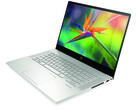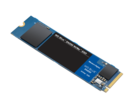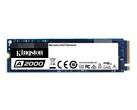HP SSD EX950 PCIe x4 NVMe SSD Benchmarked

(April 12, 2020 update: HP has made available a new firmware that addresses the odd read and write performance results published on this page. Performance should be closer to what is advertised after applying the update. Users can download the update here.)
The HP EX950 series replaces the 2018 EX920 series by offering significantly faster write rates than before and a new higher capacity 2 TB option. The 1 TB EX920, for example, promises sequential write rates of up to 1800 MB/s compared to 2900 MB/s on the 1 TB EX950. HP is targeting audio/video editors, gamers, and other performance users with its PCIe x4 EX series of NVMe SSDs similar to the Western Digital Black series or the Asura Genesis Xtreme.
The 2 TB test unit was provided by BIWIN Storage who is an authorized partner of HP. Newegg currently has the 512 GB, 1 TB, and 2 TB options in stock for $90, $155, and $270 USD, respectively, each with 5-year warranty as standard.
| Capacity | 512 GB (5MS22AA#ABC) | 1 TB (5MS23AA#ABC) | 2 TB (5MS24AA#ABC) |
| Max Sequential Read | 3500 MB/s | 3500 MB/s | 3500 MB/s |
| Max Sequential Write | 2250 MB/s | 2900 MB/s | 2900 MB/s |
| 4 KB Random Read | 390,000 IOPS | 410,000 IOPS | 410,000 IOPS |
| 4 KB Random Write | 370,000 IOPS | 370,000 IOPS | 380,000 IOPS |
Test System
The host laptop for benchmarking the HP EX950 will be the 17.3-inch Walmart EVOO 17 gaming laptop which is able to house two PCIe x4 NVMe SSDs and even a 2.5-inch SATA III drive. It shares the same chassis as the Schenker Neo 17 since both laptops are derived from the same Tongfang barebones chassis.
See our full review on the Walmart EVOO Gaming 17 to learn more about the system.
AS SSD & CrystalDiskMark
We're able to come close to the claimed sequential write rate of 2900 MB/s when running CrystalDiskMark with a queue depth of 32 on a single thread. Sequential read rates, however, max out at about 2300 MB/s only when running the benchmarks below. You'll have to run the test with 128 KB block sizes at a queue depth of 8 or greater to get closer to the claimed read rate of 3500 MB/s.
| Walmart EVOO Gaming 17 HP SSD EX950 HP SSD EX950 PCIe x4 NVMe 2TB 5MS24AA#ABC | Patriot P300P512GM28US Patriot P300 P300P512GM28US | Western Digital Blue SN550 NVMe Western Digital Blue SN550 NVMe SSD 1 TB WDS100T2B0C | Razer Blade Stealth i7-1065G7 Iris Plus Samsung SSD PM981 MZVLB256HAHQ | Dell XPS 13 9300 i5 FHD Toshiba XG6 KXG60ZNV512G | |
|---|---|---|---|---|---|
| AS SSD | 36% | 25% | -30% | -6% | |
| Seq Read (MB/s) | 987 | 1060 7% | 1852 88% | 1989 102% | 2328 136% |
| Seq Write (MB/s) | 2085 | 1300 -38% | 1322 -37% | 827 -60% | 1137 -45% |
| 4K Read (MB/s) | 47.99 | 24.37 -49% | 26.84 -44% | 40.12 -16% | 48.07 0% |
| 4K Write (MB/s) | 121.2 | 131.7 9% | 165.7 37% | 135.1 11% | 120.6 0% |
| 4K-64 Read (MB/s) | 1279 | 553 -57% | 386.4 -70% | 531 -58% | 899 -30% |
| 4K-64 Write (MB/s) | 826 | 1147 39% | 1098 33% | 309.9 -62% | 1220 48% |
| Access Time Read * (ms) | 0.025 | 0.024 4% | 0.024 4% | 0.085 -240% | 0.085 -240% |
| Access Time Write * (ms) | 0.088 | 0.092 -5% | 0.096 -9% | 0.09 -2% | 0.033 62% |
| Score Read (Points) | 1426 | 683 -52% | 598 -58% | 770 -46% | 1180 -17% |
| Score Write (Points) | 1156 | 1408 22% | 1396 21% | 528 -54% | 1455 26% |
| Score Total (Points) | 3373 | 2458 -27% | 2280 -32% | 1644 -51% | 3189 -5% |
| Copy ISO MB/s (MB/s) | 1772 | 1088 -39% | 1496 -16% | 1418 -20% | |
| Copy Program MB/s (MB/s) | 147.2 | 1202 717% | 799 443% | 382.7 160% | |
| Copy Game MB/s (MB/s) | 1587 | 1222 -23% | 1488 -6% | 334.2 -79% | |
| CrystalDiskMark 5.2 / 6 | -4% | 30% | 20% | 21% | |
| Write 4K (MB/s) | 109 | 128.5 18% | 234.3 115% | 176.8 62% | 121.9 12% |
| Read 4K (MB/s) | 52.7 | 30.98 -41% | 53.1 1% | 48.38 -8% | 50 -5% |
| Write Seq (MB/s) | 1922 | 1111 -42% | 1978 3% | 1332 -31% | 1497 -22% |
| Read Seq (MB/s) | 850 | 1100 29% | 1102 30% | 1644 93% | 2111 148% |
| Write 4K Q32T1 (MB/s) | 425.3 | 533 25% | 573 35% | 440.6 4% | 365.9 -14% |
| Read 4K Q32T1 (MB/s) | 488.5 | 652 33% | 763 56% | 559 14% | 384.6 -21% |
| Write Seq Q32T1 (MB/s) | 2689 | 1540 -43% | 2011 -25% | 1104 -59% | 2748 2% |
| Read Seq Q32T1 (MB/s) | 1907 | 1707 -10% | 2355 23% | 3481 83% | 3119 64% |
| Write 4K Q8T8 (MB/s) | 1469 | ||||
| Read 4K Q8T8 (MB/s) | 1434 | ||||
| Total Average (Program / Settings) | 16% /
22% | 28% /
27% | -5% /
-12% | 8% /
5% |
* ... smaller is better
ATTO
Unlike CDM or AS SSD, ATTO tests transfer rates across increasingly large block sizes from 512 B all the way up to 64 MB. Write rates outpace read rates whereas the opposite is true for most other SSDs. The Asura Genesis Xtreme is able to offer 2x the write rates albeit with slower read rates overall.
| Walmart EVOO Gaming 17 HP SSD EX950 , , HP SSD EX950 PCIe x4 NVMe 2TB 5MS24AA#ABC | Patriot P300P512GM28US , , Patriot P300 P300P512GM28US | Western Digital Blue SN550 NVMe , , Western Digital Blue SN550 NVMe SSD 1 TB WDS100T2B0C | Intel NUC8i7BEH Asura NVMe SSD Iris Plus Graphics 655, i7-8559U, Asura Genesis Xtreme NVMe M.2 SSD 1 TB | Samsung 960 Pro 1TB Titan X Pascal, E5-2680 v4, Samsung SSD 960 Pro 1TB m.2 NVMe | |
|---|---|---|---|---|---|
| ATTO Disk Benchmark | -35% | -9% | 20% | 27% | |
| 8192KB write (KB/s) | 2680000 | 1440000 -46% | 1830000 -32% | 1960000 -27% | 2079890 -22% |
| 4096KB write (KB/s) | 2700000 | 1440000 -47% | 1760000 -35% | 1960000 -27% | 2090010 -23% |
| 2048KB write (KB/s) | 2700000 | 1440000 -47% | 1760000 -35% | 1970000 -27% | 2090010 -23% |
| 1024KB write (KB/s) | 2680000 | 1440000 -46% | 1780000 -34% | 1960000 -27% | 2100230 -22% |
| 512KB write (KB/s) | 2700000 | 1440000 -47% | 1810000 -33% | 1960000 -27% | 2090010 -23% |
| 256KB write (KB/s) | 2680000 | 1420000 -47% | 1780000 -34% | 1920000 -28% | 2098690 -22% |
| 128KB write (KB/s) | 2480000 | 1440000 -42% | 1780000 -28% | 1940000 -22% | 2078800 -16% |
| 64KB write (KB/s) | 2140000 | 1420000 -34% | 1740000 -19% | 1870000 -13% | 2073620 -3% |
| 32KB write (KB/s) | 1710000 | 1390000 -19% | 1640000 -4% | 1620000 -5% | 2054220 20% |
| 16KB write (KB/s) | 1240000 | 1350000 9% | 1390000 12% | 1160000 -6% | 1102410 -11% |
| 8192KB read (KB/s) | 1810000 | 1470000 -19% | 2260000 25% | 2970000 64% | 2960680 64% |
| 4096KB read (KB/s) | 1690000 | 1590000 -6% | 2310000 37% | 2960000 75% | 3019900 79% |
| 2048KB read (KB/s) | 1790000 | 1590000 -11% | 2290000 28% | 2920000 63% | 3026480 69% |
| 1024KB read (KB/s) | 1980000 | 1470000 -26% | 2260000 14% | 2860000 44% | 3263860 65% |
| 512KB read (KB/s) | 1900000 | 1450000 -24% | 1630000 -14% | 2820000 48% | 3197250 68% |
| 256KB read (KB/s) | 1580000 | 1520000 -4% | 2280000 44% | 3080000 95% | 3230230 104% |
| 128KB read (KB/s) | 1800000 | 1150000 -36% | 2070000 15% | 2670000 48% | 3003310 67% |
| 64KB read (KB/s) | 1590000 | 615190 -61% | 1430000 -10% | 2550000 60% | 2458920 55% |
| 32KB read (KB/s) | 1320000 | 411140 -69% | 917140 -31% | 2190000 66% | 2432300 84% |
| 16KB read (KB/s) | 1040000 | 217710 -79% | 550840 -47% | 1440000 38% | 1257110 21% |
Temperature
Verdict
The HP EX950 is notable for its fast write rates relative to other SSDs including the all-popular Samsung PM981 found on many high-end machines. However, this seemingly comes at the cost of read rates which are slightly slower than some budget-midrange NVMe SSDs like the Patriot P300 at certain areas. Instances where it can achieve the very fast sequential read rate of 3500 MB/s require specific block sizes and queue depths. If you can exploit the fast write speeds during your daily workloads, then the HP EX950 may be worth considering. Otherwise, alternatives like the new WD SN550 can be found for cheaper.






























